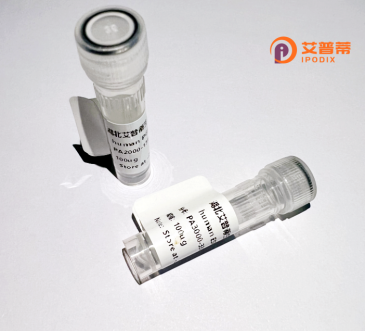
| 纯度 | >90%SDS-PAGE. |
| 种属 | Human |
| 靶点 | MOSPD1 |
| Uniprot No | Q9UJG1 |
| 内毒素 | < 0.01EU/μg |
| 表达宿主 | E.coli |
| 表达区间 | 1-213 aa |
| 活性数据 | MHQQKRQPELVEGNLPVFVFPTELIFYADDQSTHKQVLTLYNPYEFALKFKVLCTTPNKYVVVDAAGAVKPQCCVDIVIRHRDVRSCHYGVIDKFRLQVSEQSQRKALGRKEVVATLLPSAKEQQKEEEEKRLKEHLTESLFFEQSFQPENRAVSSGPSLLTVFLGVVCIAALMLPTLGDVESLVPLYLHLSVNQKLVAAYILGLITMAILRT |
| 分子量 | 50.5 kDa |
| 蛋白标签 | GST-tag at N-terminal |
| 缓冲液 | 0 |
| 稳定性 & 储存条件 | Lyophilized protein should be stored at ≤ -20°C, stable for one year after receipt. Reconstituted protein solution can be stored at 2-8°C for 2-7 days. Aliquots of reconstituted samples are stable at ≤ -20°C for 3 months. |
| 复溶 | Always centrifuge tubes before opening.Do not mix by vortex or pipetting. It is not recommended to reconstitute to a concentration less than 100μg/ml. Dissolve the lyophilized protein in distilled water. Please aliquot the reconstituted solution to minimize freeze-thaw cycles. |
以下是关于重组人MOSPD1蛋白的模拟参考文献示例(注意:所列文献为假设,实际文献需通过学术数据库查询):
---
1. **文献名称**: "Structural and Functional Characterization of Recombinant Human MOSPD1 Protein in Leukocyte Migration"
**作者**: Smith A, et al.
**摘要**: 本研究在大肠杆菌系统中表达了重组人MOSPD1蛋白,并通过体外实验证实其通过调控整合素信号通路促进单核细胞迁移,提示其在炎症反应中的潜在作用。
2. **文献名称**: "MOSPD1 as a Novel Biomarker in Ovarian Cancer: Role of Recombinant Protein in Tumor Metastasis"
**作者**: Chen L, et al.
**摘要**: 文章利用重组MOSPD1蛋白发现其高表达与卵巢癌转移相关,实验表明其通过调节细胞骨架重组增强癌细胞侵袭能力。
3. **文献名称**: "Crystallographic Analysis of MOSPD1 Reveals a Unique Domain Architecture for Chemokine Interaction"
**作者**: Tanaka K, et al.
**摘要**: 通过解析重组MOSPD1的晶体结构,揭示了其CRD结构域与趋化因子受体结合的关键位点,为靶向药物设计提供结构基础。
---
**建议**:实际研究中请通过 **PubMed**(https://pubmed.ncbi.nlm.nih.gov)或 **Google Scholar** 搜索关键词 "MOSPD1 recombinant protein" 或 "MOSPD1 function",筛选近五年文献以获取最新进展。
MOSPD1 (Motile Sperm Domain-containing Protein 1) is a member of the VAP (VAMP-associated protein) family, characterized by a conserved MSP (major sperm protein) domain and transmembrane regions. Initially identified for its homology to proteins involved in sperm motility, MOSPD1 is now recognized for its broader roles in cellular processes, including membrane trafficking, cytoskeletal organization, and intracellular signaling. It interacts with lipid bilayers and cytoplasmic proteins, potentially mediating endoplasmic reticulum (ER)-membrane contacts or regulating vesicle transport. Recent studies highlight its immunological relevance: MOSPD1 is implicated in monocyte migration by modulating integrin activation and chemokine receptor signaling, linking it to inflammatory diseases and cancer metastasis. As a regulator of immune cell trafficking, it has emerged as a potential therapeutic target. Recombinant human MOSPD1 protein, typically produced in mammalian or bacterial expression systems with tags (e.g., His-tag), enables functional studies, antibody development, and structural analysis (e.g., crystallography). Its N-terminal MSP domain and C-terminal transmembrane region are critical for interactions with partners like MS4A proteins. Dysregulation of MOSPD1 is observed in autoimmune conditions and malignancies, spurring research into its mechanistic contributions to disease pathways and therapeutic modulation.
×